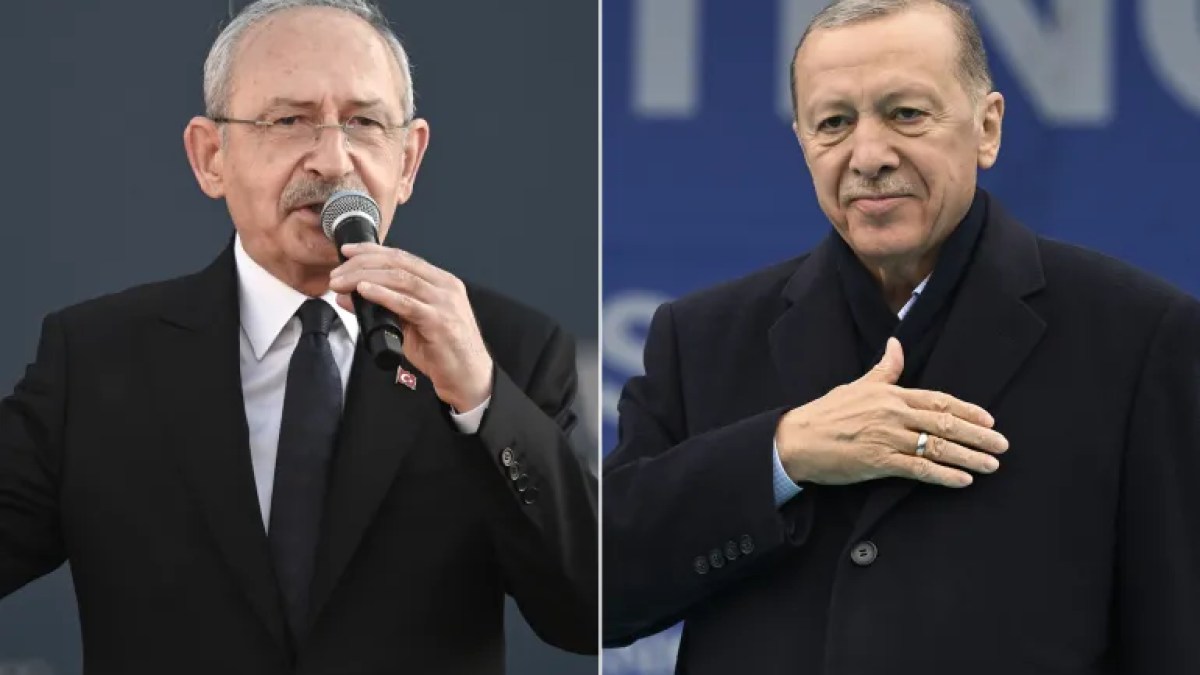Turkey's secular opposition leader Kemal Kılıçdaroğlu's chances of winning the May 28 presidential run-off look "remote," according to analysts who believe President Recep Tayyip Erdogan is in a better position given the comfortable vote margin he received in the first round.
Kılıçdaroğlu, 74, the candidate of the six-party opposition alliance, won 6 percent of the vote in Sunday's ballot, while Erdogan, 45, received 69.49 percent, slightly below the majority needed to avoid a run-off.
In the parliamentary elections held simultaneously, the People's Alliance, which includes Erdogan's Justice and Development Party (AKP) and nationalist and Islamist parties, won 322 of the 600 seats in the new parliament.
After its disappointing results, the Turkish opposition on Tuesday resumed its campaigns in an attempt to mobilize the voices of young people, playing on the difficult economic situation, the depreciation of the Turkish lira and high inflation.
Addressing young people, Kılıçdaroğlu wrote on Twitter: "You can't afford anything. You even have to think about the price of a cup of coffee. The joy of life has been stolen from you while young people are supposed to be carefree. They didn't give you that for a day."
"You will never get your youth back. We have 12 days to go, we have to get out of the dark tunnel."
On Kılıçdaar's approach to youth, Birk Essen, a political scientist at Sabancı University in Istanbul, said, "Kılıçdaroğlu is not a new name for young people, he is 74 years old, and he did not really succeed in mobilizing young voters."
"The opposition is completely disjointed, it will be difficult for it to regroup to win" in the second round on May 28, he said, expecting "a lower turnout than in the first round".
In the opposite camp, Ibrahim Kalin, spokesman for the Turkish presidency and a close adviser to Erdogan, said on Tuesday: "The second session will be easier for us. There is a difference of 5 points (between the candidates), about two and a half million votes. It seems that they have no chance of filling this gap."
Kurds Paper
Besides young people, Kılıçdaroğlu hopes that the Kurds, who represent about 10 percent of the electorate, will vote strongly for him in the second round.
The pro-Kurdish Peoples' Democratic Party (HDP) announced at the end of April its support for the opposition leader, himself an Alawite Kurd, but the turnout in the first round in Kurdish-majority provinces was believed to be around 80 percent, well below the national average of about 89 percent.
But getting greater Kurdish support could be a double-edged sword that makes Kılıçdaroğlu's attempt to come to power nearly impossible, as Erdogan has succeeded in linking the opposition to the outlawed armed Kurdistan Workers' Party (PKK), which has waged an armed insurgency against the Turkish state for decades, a rhetoric that has apparently succeeded in framing nationalists and conservatives.
Soner Kagptay, an analyst at The Washington Institute, said, "In general, the electoral alliance between Kılıçdaroğlu and the pro-Kurdish Peoples' Democratic Party (HDP) has hurt him."
"Some HDP voters in Kurdish-majority provinces stayed home on election day, while some Turkish nationalist voters abandoned Kılıçdaroğlu and blamed him for his alliance with the HDP," he said.
Sinan Ogan block
Sinan Ogan, the nationalist candidate, received 5 percent of the vote, and his support could be decisive in the second round. Erdogan is a secular nationalist far from religious conservatives, but he has also waged a vigorous campaign against "terrorism," a word many Turkish politicians use to condemn Kurds.
Kursad Ertugrul of Ankara's Middle East Technical University believes that "the anti-Kurdish nationalism of the current represented by Ogan makes it very difficult for Kılıçdaroğlu to make a deal" with him.
Ertugrul said Erdogan's campaign is likely to continue to focus on security issues, a winning formula among the "conservative nationalist" working class, and the idea of building a "great Turkey" through infrastructure projects and taking advantage of the "moral sensitivities of the conservative majority" was also at the heart of Erdogan's messages.
Even if Kılıçdaroğlu somehow gets Ogan's support, it is likely that Kurds will refrain from voting for him, according to Berk Esen, a professor of political science at Sabanci University.
Essen added that after winning 49.5 percent in the first round, Erdogan does not need to make significant concessions to Ogan to win in the second round.
Emre Becker of the Eurasia Consulting Group argues that it will be easier for Erdogan to appeal to voters than his rival, and Erdogan's supporters are also likely to participate in greater numbers to vote in the run-off than Kılıçdaroğlu supporters as opposition momentum wanes.

